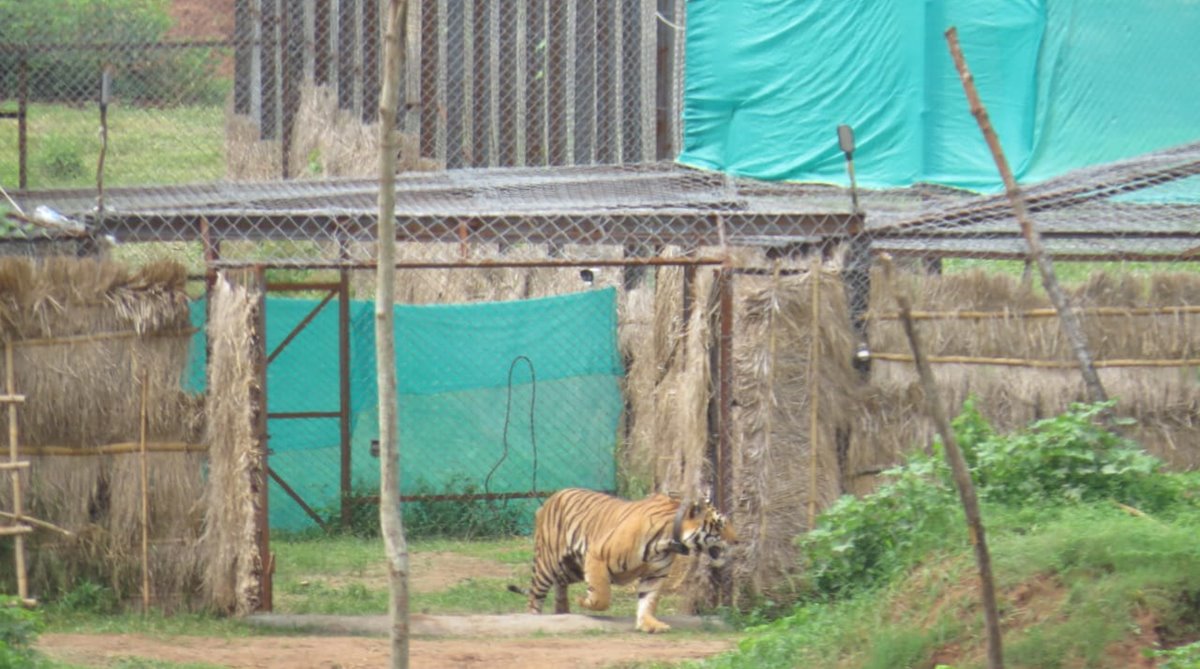The tiger from Kanha Tiger Reserve in Madhya Pradesh that was translocated to Satkosia Tiger Reserve in Odisha last month and kept in a enclosure was released into the wild on 7 July.
It was a historic event for the country’s tiger conservation campaign as this had been the first ever inter-state wild-to-wild release of a big cat in India.
Advertisement
On 21 June, a majestic wild Royal Bengal tiger aged around 3 was brought to the Satkosia reserve in Odisha’s Angul district from Kanha Tiger Reserve in MP. It was transported in a special vehicle equipped with temperature and moisture control. The 24-hour road journey had been monitored by tiger experts from MP and the Wildlife Institute of India, besides wildlife officers from MP and Odisha. A team of veterinary doctors was also present all along, according to Additional Chief Conservator of Forests, Angul, Sudarsan Panda.
The Kanha tiger had been temporarily kept in a two-and-a-half-acre enclosure created for it. The enclosure had a prey base, a water body and CCTVs to monitor its health and help it acclimatise to the new surroundings.
Panda had then said the tiger would be kept in the enclosure for a day or two before it could be released to the wild.
The release, however, took longer than expected.
Officials said the decision to send it to the wild was taken after it was observed that the animal had started to acclimatise to its new home, and all its vital parameters were found in good shape.
“The male tiger aged three years was found to be in normal health and psychological status. The tiger was successfully released into the wild after opening the gate of the enclosure. The movement of the tiger inside the reserve is being monitored by the officials of STR and the experts of Wildlife Institute of India along with the veterinarians round the clock,” Panda said on Friday.
Additional Chief Secretary of Forest Suresh Mahapatra, PCCF, Wildlife, Sandeep Tripathi and other senior forest officers were present during the release of the tiger.
The decision to release the tiger was taken after National Tiger Conservation Authority (NTCA) Member Secretary Dr Anup Nayak interacted with state officials and Wildlife Institute of India representatives during his recent two-day visit. Dr Nayak suggested early release of the tiger.
With the tiger on its own now, a special team will regularly track it through radio frequency signals and satellite round the clock.
The tiger will have an area of about 1000 sq km of five districts to move about, and the prey base in this forest spread is said to be high. It was after due study and survey that the tiger experts, WII, Ministry of Forests and authorities of both states had agreed to the inter-state transfer of wild tigers.
Meanwhile, another two-year-old tigress that had been relocated from Bandhavgarh Tiger Reserve in MP to Satkosia on June 28 is waiting to be paired with the Kanha tiger. Still kept under observation inside a special enclosure, the tigress is likely to be released into the wild shortly.
The Satkosia Tiger Reserve is scheduled to receive four more tigers from MP in phases.
The relocation of the big cats is part of the state government’s move to boost tiger population in the 963 sq-km protected forests of Satkosia. The reserve had until now only two tigers, both quite old.
Forest Minister Bijayshree Routray had taken the initiative last year and held a series of meetings with the WII and tiger experts. As the government felt it necessary to get at least six more tigers, a study of Satkosia was conducted by experts who approved of the translocation.
Earlier, tiger translocation had taken place from one reserve to another within a state. This is for the first time an inter-state translocation of big cats is taking place in the country.









